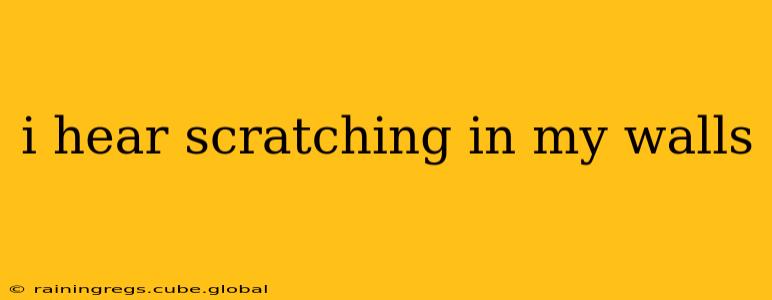Hearing scratching noises in your walls is unsettling. That persistent scratching can keep you up at night, leaving you wondering what creature—or worse—is behind the sound. This comprehensive guide will help you identify the source of the scratching and provide solutions to resolve the issue. We'll explore common culprits, troubleshooting steps, and preventative measures to ensure peace and quiet in your home.
What Could Be Scratching in My Walls?
The most common culprits behind wall scratching noises are animals, insects, or even structural issues. Let's break down the possibilities:
Rodents (Mice, Rats): These are the most likely culprits. Mice and rats are notorious for their nighttime activity and the telltale scratching sounds they make as they navigate wall cavities, chew on wires, and build nests. Their activity is often more noticeable at night when they feel safer.
Insects (Carpenter Ants, Termites): While not always accompanied by obvious scratching, carpenter ants and termites can create rustling or scratching sounds as they burrow through wood. This is usually accompanied by other signs of infestation like frass (insect droppings) or visible damage to wood.
Squirrels or Other Wildlife: Depending on your location and the structure of your home, larger animals like squirrels, birds, or even raccoons could be nesting or moving around within your walls. Their scratching will typically be louder and more sporadic than rodent activity.
Pipes or Wiring: Expansion and contraction of pipes due to temperature changes or the movement of wires within the walls can sometimes produce scratching or rubbing sounds. This is usually a consistent, repetitive sound, rather than intermittent scratching.
Structural Issues: In older homes, settling or shifting foundations can cause timbers to rub against each other, generating scratching noises. This is often accompanied by other structural issues like cracks in the walls or floors.
How Do I Identify the Source of the Scratching?
Pinpointing the source requires careful observation and investigation:
Pinpoint the Location: Try to pinpoint the exact location of the scratching. Is it concentrated in one area of the wall? Does it seem to be coming from above, below, or within the wall itself? This will help narrow down the possibilities.
Listen Carefully: Pay attention to the type of scratching. Is it a high-pitched scratching (possibly mice), a deeper, more forceful scratching (possibly rats or larger animals), or a more subtle rustling sound (possibly insects)? The frequency and timing of the scratching also provide clues.
Look for Evidence: Check for droppings, holes in the walls or baseboards, gnaw marks on wood, or any other signs of animal activity. Look around the exterior of your home for potential entry points.
What Should I Do About the Scratching in My Walls?
The solution depends on the source of the scratching:
Rodents: The best course of action is to contact a pest control professional. They have the expertise and tools to safely and effectively remove rodents and prevent future infestations. They can also identify potential entry points and seal them.
Insects: Similar to rodents, professional pest control is recommended to deal with insect infestations. Carpenter ants and termites can cause significant structural damage if left untreated.
Larger Animals: If you suspect larger animals like squirrels or raccoons, contact wildlife removal specialists. They can safely remove the animals and repair any damage to your home.
Pipes or Wiring: If you suspect the noise is coming from pipes or wiring, contact a qualified plumber or electrician to investigate and address any potential issues.
Structural Issues: If you believe the scratching is related to structural issues, it's crucial to contact a qualified structural engineer or contractor to assess the situation and recommend appropriate repairs.
How Can I Prevent Scratching in My Walls in the Future?
Preventing future problems involves proactive measures:
- Seal all potential entry points: Inspect the exterior of your home for cracks, gaps, or holes around pipes, vents, and other openings, and seal them with caulk or steel wool.
- Store food properly: Keep food in airtight containers to prevent attracting rodents.
- Regular home inspections: Conduct regular inspections of your home to check for signs of pest infestation or structural damage.
- Proper landscaping: Keep vegetation trimmed away from the exterior of your home to prevent animals from accessing your walls.
By carefully investigating the source of the scratching noises and taking appropriate action, you can restore peace and quiet to your home and prevent future problems. Remember, early detection and professional help are key to resolving this issue efficiently and safely.
